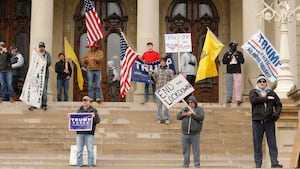Under Washington state’s statewide coronavirus stay-at-home order, residents can’t go to the barber or work out at the gym. But in Snohomish County—which has seen more than 2,150 cases, including one of the first in the country—Sheriff Adam Fortney says his deputies won’t stop people who break the order.
“Along with other elected Sheriffs around our state, the Snohomish County Sheriff’s Office will not be enforcing an order preventing religious freedoms or constitutional rights,” Fortney wrote in a Facebook post on Tuesday.
Already under pressure from the Trump administration and a national right-wing network of anti-social distancing protesters, governors trying to balance economic and public health interests are facing additional challenges at the local law enforcement level. With his Facebook post, Fortney joined a growing trend of sheriffs across the country who are refusing to enforce stay-at-home orders—and tapping into an extremist anti-government movement that believes that sheriffs are the highest legal authority in the country.
Four sheriffs in Michigan have refused to enforce the stay-at-home order issued by Democratic Gov. Gretchen Whitmer and which has become the focus of much of the conservative backlash to social distancing measures. Two Wisconsin sheriffs have said they won’t enforce that state’s order. And, elsewhere in Washington, Franklin County Sheriff J.D. Raymond issued a letter saying his department wouldn’t enforce the order issued by another Democratic governor, Jay Inslee.
“Neither I nor my office will enforce any arrests or fines regarding the operation of privately owned businesses,” Raymond wrote.
The legal foundation for Fortney and the other sheriffs to refuse enforcement of governors’ stay-at-home orders are shaky at best. But they have a strong ideological basis on the extremist right’s “Constitutional Sheriff” movement, where anti-government activists have claimed for decades that sheriffs can ignore laws with which they disagree.
“The whole thrust of the Constitutional Sheriffs movement is that a sheriff is not beholden to federal authorities, which is completely disproven by federal jurisprudence in any number of cases,” Howard Graves, a senior researcher at the Southern Poverty Law Center, told The Daily Beast.
The idea that elected sheriffs—as opposed to state or federal governments—hold supreme legal power originated in the 1960s and ’70s in the “Posse Comitatus” movement, which was tied to white supremacist groups, according to Graves.
“They held that the sheriff was the highest law of the land,” Graves said.
Posse Comitatus fell from prominence on the extremist right after several cases in which members fired on federal law enforcement officials, including the 1983 murder of two U.S. marshals in North Dakota. But many of its obscure legal theories experienced a renaissance during the Obama administration, when right-wing activists—opposed to the Affordable Care Act and federal land laws and afraid of new gun control measures—became convinced that they could be saved by local elected sheriffs.
The sheriffs willing to buck federal and state governments during the Obama administration were boosted by right-wing media outlets, including Fox News. Two of the prominent supporters of the so-called Constitutional Sheriffs, former Maricopa County Sheriff Joe Arpaio and former Milwaukee County Sheriff David Clarke, became stars on the right, with Arpaio eventually receiving a pardon from Trump after being convicted over racial profiling.
“Fox News in particular was really prolific in bringing these people on TV and promoting their anti-government rhetoric, and it’s the same thing that they’re doing now with these protests against quarantine,” said Graves.
The Constitutional Sheriffs concept was also embraced by rancher Cliven Bundy, whose family members and supporters led anti-government militia groups in standoffs against law enforcement officials in Nevada and Oregon. In a sign of the leading role played by sheriffs in the anti-government movement, LaVoy Finicum, a participant in the Oregon standoff, was shot by law enforcement officials on his way to meet with a sympathetic sheriff. Finicum has since become a martyr on the extremist right.
“This guy’s final mission was to get to this local sheriff’s meeting,” Graves said.
Ammon Bundy, who led the Oregon standoff, has reinvented himself in the coronavirus era as one of the most outspoken voices on the far right against stay-at-home orders.
“I think it’s notable that Ammon Bundy was an early example of this kind of in-person protest of stay-at-home orders,” said Lindsay Schubiner, a program director at the Western States Center, a left-leaning group that tracks extremist groups in the Pacific Northwest.
More recently, right-wing activists have turned sheriffs into figures of defiance against gun control laws. In January, new gun control measures from Democratic lawmakers in Virginia prompted sheriffs in the state to say they would refuse to enforce the laws, with one even claiming he would deputize would-be gun owners to get around the law.
In 2019, self-described Constitutional Sheriffs in Washington, urged on by militia and extremist right-wing groups, refused to enforce a new gun law. Using sheriffs to challenge laws is a part of a broader campaign from extremist groups in the state to foil the state legislature, according to Schubiner.
“The strategy has also included threats and intimidation directed at public officials and civil servants,” Schubiner said.
The reach of the movement has limits outside of the confines of the far right. Arpaio ran a failed campaign for U.S. Senate in Arizona. Clarke was floated for a Trump administration post but those plans were scrapped after swift public backlash. And while some sheriffs have been at the forefront of anti-gun control movements, others have been prominent backers of policies to expand background checks.
In that same vein, it’s not clear yet how significant the refusal of sheriffs to enforce stay-at-home orders will be. Inslee blasted the Washington state sheriffs on Wednesday, saying they didn’t have the legal power to refuse to enforce coronavirus orders.
“We cannot have individual law enforcement officers arbitrarily decide which laws they're going to enforce,” he said, without specifying what legal powers he could use against the sheriffs. “Encouraging illegal activity jeopardizes the health of people in our communities.”
Fortney, who didn’t respond to a request for comment, appears to be having second thoughts himself. At a Wednesday press conference, the sheriff appeared to walk back his Facebook post, claiming he was not calling for “open defiance” and saying he hoped his dispute with Inslee wouldn’t end up in court.
“My Facebook post definitely started some conversation, there’s no doubt about it,” Fortney said.







